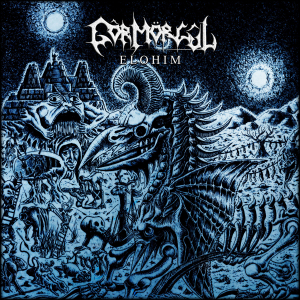
For more than a decade, Gôr Mörgûl dwell around to bring us their message of blasphemy and black magic. With Elohim, this band from Sardinia, Italy, brings forth their third full length opus, continuing the path they started in 2010 with In The Sign Of Blackness, followed by the EP Ruins Of The Icons Of God (2014) and the second full album, Heresy (2015). One again we had to wait quite some time, but Elohim might be worth waiting for so long.
The album gets released once more in the partnership of Satanath Records from the Russian Federation and Death Portal Studio from the U.S. It’s an eight-tracker that gets released in a regular CD-edition (i.e. jewel case) (500 physical copies, besides the digital ones) with a four-page booklet that includes quite unusual and strange, experimental cover artwork, but no lyrics, unfortunately (which are, by the way, in English, Latin and ancient Greek).
Totally in the vein of the former works, Elohim stands for more than half an hour of intense, energetic and mainly fast (1), yet quite melodic (2) and varying (3) Technical Death Metal (4) with a blackened edge (5). I’ll go little deeper into these things.
- This stuff sounds furious, warlike and kinetic as from the very beginning until the end. Reminiscent of the North American and Polish scene, the material on this album is merciless, unstoppable, fast-forward and malicious. The guitar riffing comes with that destructive tangle, but it’s the drum part especially that creates the devastating and taking-no-prisoners attitude.
- Notwithstanding the enormous power behind the better part of this album, Gôr Mörgûl somehow succeed to maintain a melodious approach, with great tremolo riffing, dual leads and some sharp-edged yet transcending solos. Especially the slower excerpts, yet most fast ones too, are sort of blessed with that crafted approach.
- Despite the fact that the album is blasting fast especially, there are several tempo-changes, in about each composition, with a diversification in structure and speed. The latter refers to a couple of ultimately blasting eruptions, yet also quite some mid- to up-tempo chapters. Another remarkable thing that characterises the diversity of this recording is the balance in between groovier pieces, atmospheric passages, right-in-the-face parts and so on. Lamaštu is an example of all this, with slower riffs and eruptional outbursts, a fine equilibrium in between harsh warmonger and integer moments (cf. the acoustic intermezzo), and much more. Acoustic excerpts, by the way, do appear more than once at very well-balanced, ideally chosen moments.
- The craftsmanship, well, I was quite enthusiastic about the members’ skills in the past, but the craftsmanship exceeds the average easily. It all starts with the song writing, which asks for a technical high-skilled approach. And that’s exactly what the professionally skilled quartet aims for: defining their ability to translate the technical song writing into a satisfying sonic result.
- The band does not perform Black Metal, as said, but there is such an atmosphère noire going on. It’s the lyrical side, and the languages used, it’s about the Arab / Persian / Mesopotamian influences, it’s the overall atmosphere that overwhelms, captures, bewitches.
Elohim is not a renewing album, for it represents a sub-trend that exists for a while. It does not reinvent the scene, not opens it the portal to another sonic dimension. But within its specific genre, it is one of the better recordings in quite some time. Recommended if you appreciate everything in the vein of, let’s say, Neter, Blood Of Kingu, Dalkhu, Archgoat, Preludium, Veld, Demonic Obedience, Misanthropic Existence and Akhenaten; even fans of Arkhon Infaustus, Behemoth, Azarath or Morbosidad might adore this material…
https://satanath.bandcamp.com/album/sat249-g-r-m-rg-l-elohim-2019
http://satanath.com/releases/item/sat249.html
https://www.concreteweb.be/reviews/g%C3%B4r-m%C3%B6rg%C3%BBl
